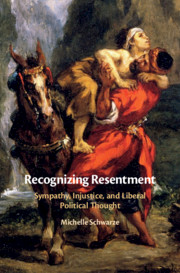4 results
Chapter 6 - Experimental Natural Philosophy and Moral Philosophy
- from Part II - The Heyday of Experimental Philosophy
-
- Book:
- Experimental Philosophy and the Origins of Empiricism
- Published online:
- 17 February 2023
- Print publication:
- 23 February 2023, pp 176-200
-
- Chapter
- Export citation
2 - Innocent Resentment, Sympathy, and Liberal Duty in Butler
-
- Book:
- Recognizing Resentment
- Published online:
- 02 October 2020
- Print publication:
- 22 October 2020, pp 46-64
-
- Chapter
- Export citation

Recognizing Resentment
- Sympathy, Injustice, and Liberal Political Thought
-
- Published online:
- 02 October 2020
- Print publication:
- 22 October 2020
7 - Moral Sense Theories and Other Sentimentalist Accounts of the Foundations of Morals
-
-
- Book:
- The Cambridge Companion to the Scottish Enlightenment
- Published online:
- 04 October 2019
- Print publication:
- 26 September 2019, pp 131-150
-
- Chapter
- Export citation

